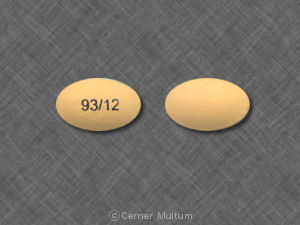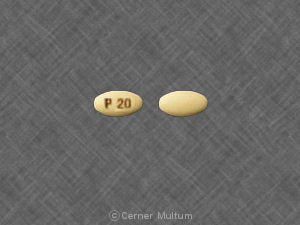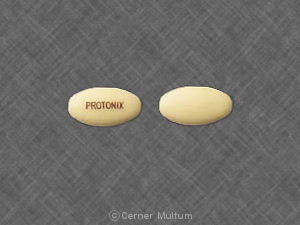What is the most important information I should know about pantoprazole?
Call your doctor at once if you have symptoms of a serious side effect: decreased urination, blood in your urine, severe stomach pain, watery or bloody diarrhea, or symptoms of joint pain or a skin rash that worsens in sunlight.
You may be more likely to have a broken bone while using pantoprazole. Tell your doctor right away if you have unusual pain in your wrist, hip, or spine.
What is pantoprazole?
Pantoprazole is a proton pump inhibitor that decreases the amount of acid produced in the stomach.
Pantoprazole is used to treat erosive esophagitis (damage to the esophagus from stomach acid caused by gastroesophageal reflux disease, or GERD) in adults and children who are at least 5 years old. Pantoprazole is usually given for up to 8 weeks at a time while your esophagus heals.
Pantoprazole is also used to treat Zollinger-Ellison syndrome and other conditions involving excess stomach acid.
Pantoprazole is not for immediate relief of heartburn.
Pantoprazole may also be used for purposes not listed in this medication guide.
What should I discuss with my healthcare provider before using pantoprazole?
Heartburn can mimic the first symptoms of a heart attack. Get emergency medical help if you have chest pain that spreads to your jaw or shoulder and you feel anxious or light-headed.
You should not use this medicine if:
- you also take medicine that contains rilpivirine (Edurant, Complera, Juluca, Odefsey); or
- you are allergic to pantoprazole or similar medicines (lansoprazole, omeprazole, Nexium, Prevacid, Prilosec, and others).
Tell your doctor if you have ever had:
- low levels of magnesium in your blood;
- lupus; or
- osteoporosis or low bone mineral density.
You may be more likely to have a broken bone while using pantoprazole. Talk with your doctor about ways to keep your bones healthy, especially if you are an adult over 50.
It is not known whether this medicine will harm an unborn baby. Tell your doctor if you are pregnant or plan to become pregnant.
You should not breast-feed while using this medicine.
Pantoprazole is not approved for use by anyone younger than 5 years old.
How should I use pantoprazole?
Follow all directions on your prescription label and read all medication guides or instruction sheets. Use the medicine exactly as directed.
Use the lowest dose for the shortest amount of time needed to treat your condition.
Pantoprazole is taken by mouth (oral) or given as an infusion into a vein (injection). A healthcare provider may teach you how to properly use pantoprazole injection by yourself.
Pantoprazole tablets are taken by mouth, with or without food. Pantoprazole oral granules should be taken 30 minutes before a meal.
Do not crush, chew, or break the tablet. Swallow it whole.
The oral granules should be mixed with applesauce or apple juice and given either by mouth or through a nasogastric (NG) tube.
Read and carefully follow any Instructions for Use provided with your medicine. Ask your doctor or pharmacist if you have any questions.
Use this medicine for the full prescribed length of time. Your symptoms may improve before the condition is fully treated.
If you use pantoprazole for longer than 3 years, you could develop a vitamin B-12 deficiency. Talk to your doctor about how to manage this condition.
Call your doctor if your symptoms do not improve or if they get worse while you are using this medicine.
Pantoprazole can cause false results with certain medical tests, including a urine drug screening test. Tell the doctor or laboratory staff that you are using this medicine.
Store this medicine at room temperature away from moisture, heat, and light.
What happens if I miss a dose?
Use the medicine as soon as you can, but skip the missed dose if it is almost time for your next dose. Do not use two doses at one time.
What happens if I overdose?
Seek emergency medical attention or call the Poison Help line at 1-800-222-1222.
What should I avoid while using pantoprazole?
This medicine can cause diarrhea, which may be a sign of a new infection. If you have diarrhea that is watery or bloody, call your doctor. Do not use anti-diarrhea medicine unless your doctor tells you to.
What are the possible side effects of pantoprazole?
Get emergency medical help if you have signs of an allergic reaction: hives; difficulty breathing; swelling of your face, lips, tongue, or throat.
Call your doctor at once if you have:
- severe stomach pain, diarrhea that is watery or bloody;
- new or unusual pain in your wrist, hip, or back;
- bruising or swelling where intravenous pantoprazole was injected;
-
new or worsening symptoms of lupus --joint pain or swelling with a skin rash on your cheeks or arms (worsens in sunlight);
-
kidney problems --urinating less than usual, blood in your urine, swelling, rapid weight gain;
-
symptoms of low magnesium --dizziness, fast heartbeats, feeling jittery, muscle pain or weakness, spasms in your hands and feet, a choking feeling, or a seizure; or
-
symptoms of low vitamin B --muscle weakness, irregular heartbeats, feeling light-headed or short of breath, pale skin, tiredness, mood changes, numbness or tingling in your arms and legs.
Common side effects may include:
- headache, dizziness;
- stomach pain, gas, nausea, vomiting, diarrhea;
- joint pain; or
- fever, rash, or cold symptoms (most common in children).
This is not a complete list of side effects and others may occur. Call your doctor for medical advice about side effects. You may report side effects to FDA at 1-800-FDA-1088.
What other drugs will affect pantoprazole?
Tell your doctor about all your other medicines. Some may interact with pantoprazole, especially:
- digoxin;
- methotrexate; or
- a diuretic or "water pill."
This list is not complete. Other drugs may affect pantoprazole, including prescription and over-the-counter medicines, vitamins, and herbal products. Not all possible drug interactions are listed here.
Where can I get more information?
Your pharmacist can provide more information about pantoprazole.
Remember, keep this and all other medicines out of the reach of children, never share your medicines with others, and use this medication only for the indication prescribed.
Every effort has been made to ensure that the information provided by Cerner Multum, Inc. ('Multum') is accurate, up-to-date, and complete, but no guarantee is made to that effect. Drug information contained herein may be time sensitive. Multum information has been compiled for use by healthcare practitioners and consumers in the United States and therefore Multum does not warrant that uses outside of the United States are appropriate, unless specifically indicated otherwise. Multum's drug information does not endorse drugs, diagnose patients or recommend therapy. Multum's drug information is an informational resource designed to assist licensed healthcare practitioners in caring for their patients and/or to serve consumers viewing this service as a supplement to, and not a substitute for, the expertise, skill, knowledge and judgment of healthcare practitioners. The absence of a warning for a given drug or drug combination in no way should be construed to indicate that the drug or drug combination is safe, effective or appropriate for any given patient. Multum does not assume any responsibility for any aspect of healthcare administered with the aid of information Multum provides. The information contained herein is not intended to cover all possible uses, directions, precautions, warnings, drug interactions, allergic reactions, or adverse effects. If you have questions about the drugs you are taking, check with your doctor, nurse or pharmacist.
Copyright 1996-2018 Cerner Multum, Inc. Version: 18.01. Revision date: 2/15/2018.



